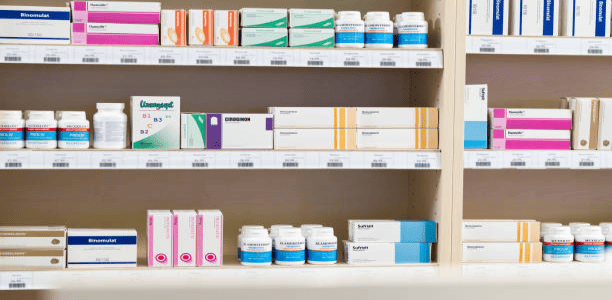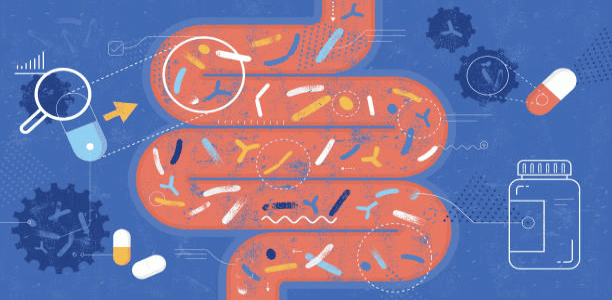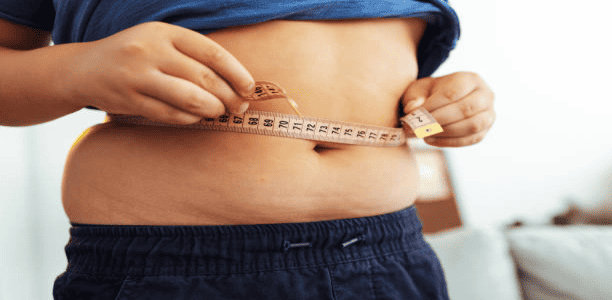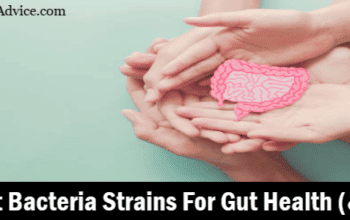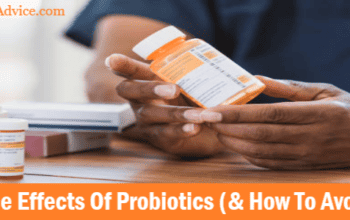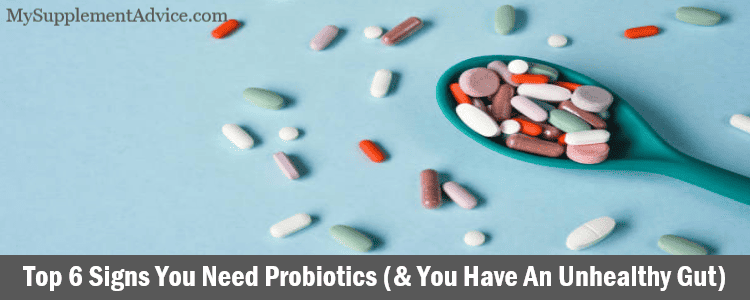
So what are the top 6 signs you need probiotics?
How do you know if you have an unhealthy gut (and you need to fix it)?
Well – we're going to answer those questions in this article.
In this way, you will have an idea on whether you need probiotics or not.
Note: This article includes references and studies on Probiotics and Gut Health.
Signs You Need Probiotics (In A Nutshell)
First of all, probiotics are living microorganisms that provide several health benefits.
They are comprised of yeast and bacteria that restore the natural balance in the gut.
Usually – they come in different products in the market (such as supplements, drinks or foods).
So what are the top signs that you need to include probiotics in your everyday routine?:
- frequent digestive problems
- some types of skin issues
- difficult weight loss
- certain foods/ingredients intolerance
- recurring mood swings
Your gut also needs probiotics after taking antibiotics for a while.
Just so you know, taking care of your gut is very important.
That's because it's the home of trillions of microorganisms that play critical roles in your body.
They are crucial when it comes to digestion, immune defense and nutrient absorption.
So an unhealthy gut can manifest into different health problems.
Some of them can even lead to long-term complications and chronic diseases.
With that, a healthy gut microbiome is essential in keeping your health in its optimum state.
What Are Probiotics?
Before jumping to the next chapters, let's define probiotics first [1]:
- live microorganisms that offer several benefits to the human body
- probiotics are usually made up of bacteria and yeast
- they aim to restore the natural balance of the digestive system
- probiotics are usually in the form of foods, drinks or supplements
Now – here are the common probiotics included in the products you can find on the market [2]:
- Bacillus
- Lactobacillus
- Escherichia
- Bifidobacterium
- Saccharomyces
- Enterococcus
- Streptococcus
Generally – probiotic products are safe for overall health and come with different benefits [3]:
- alleviate Irritable Bowel Syndrome (IBS)
- assist with better digestion
- delay the development of allergies
- prevent and treat vaginal and urinary infections
- support the immune system and nutrient absorption
- lower inflammation and other chronic conditions
- improve skin health and mental sharpness
But you should also make sure that you take them correctly.
In that way, you could avoid the common potential side effects they come with.
With that, let's determine the signs that show you need probiotics and you have an unhealthy gut.
#1 – Recurring Digestive Issues
Honestly – frequent digestive problems are the most common signs that you need probiotics.
To be exact, here are the issues you might experience [4]:
- constipation
- bloating and gas
- diarrhea (infectious, Clostridium difficile-associated and antibiotic-associated)
- hepatic encephalopathy
- ulcerative colitis
- irritable bowel syndrome (IBS)
- functional gastrointestinal disorders
- inflammatory bowel disease (IBD)
- necrotizing enterocolitis
Now – the gut microbiome is very important when it comes to better digestion.
It is involved in metabolizing and synthesizing different essential nutrients for the body to function [5].
So gut dysbiosis will affect nutrient breakdown and absorption.
If the foods you eat are not be digested properly, you would definitely experience digestive issues.
With that – you surely need the help of probiotics.
They will balance out the number of good bacteria in your gut.
In that way, the nutrients from the food you eat should be obtained in the best forms.
#2 – Antibiotic Use
Antibiotics are needed to treat certain infections caused by bad bacteria (not by viruses) [6].
There are several reasons why you need to take antibiotics [7]:
- urinary tract infections
- bloodstream infections
- skin abscess/impetigo
- bacterial pneumonia
- ear infections
- streptococcal pharyngitis
However – it would be best if you don't take antibiotics on your own.
A consultation with a doctor is absolutely mandatory before using these drugs.
What do antibiotics do to your body?
Well – they stop the growth of the bacteria that cause infection [8].
However, there are instances when even the beneficial bacteria from your gut are also killed.
This can lead to a disruption in your gut microbiome balance.
The end results are gastrointestinal symptoms or worse, chronic conditions.
With that, it's very beneficial to take probiotics during or after the course of antibiotics [9].
In that way, you can balance and restore your gut bacteria.
Also – they can alleviate the possible digestive symptoms caused by antibiotics.
#3 – Skin Problems
Sometimes, the gut also plays an important role in keeping your skin healthy [10].
With that, skin issues could also be signs of the current status of your gut microbiome.
So if you're curious, here are the skin manifestations of an unhealthy gut [11]:
- psoriasis
- acne vulgaris
- chronic urticaria
- atopic dermatitis or eczema
- dandruff [12]
Now – an unbalanced gut bacteria can lead to inflammation.
It will then trigger the skin conditions mentioned above.
In addition, your gut not functioning properly can also affect nutrient absorption.
In this case, your skin might not get the essential vitamins it needs.
As I mentioned, probiotics can help restore gut balance.
They contribute to the holistic approach to keeping the skin healthy.
#4 – Difficulty in Losing Weight
There are a lot of reasons why a person has difficulties in losing weight.
I listed some of them below [13]:
- PCOS
- hypothyroidism
- genetics
- insulin resistance
- leptin resistance
- Cushing syndrome
- stress and poor sleep
But let's look at the connection between an unhealthy gut and weight loss issues.
Now – an unfortunate change in your gut microbiota can lead to metabolic disorders [14].
In some studies, genetics contribute to your body's metabolic speed [15].
But it's not the end of the world, since probiotics can also help you not to gain more weight.
It's by balancing the gut bacteria to reduce inflammation, metabolic disorders and gut permeability [16].
In that way – you create a promising gut environment for weight loss.
So if you want to avoid weight gain while focusing on losing weight, probiotics are a must in your routine.
Even more, you can consider trying some special probiotics made for weight loss.
#5 – Food Intolerance
Firstly – let's define what food intolerance is.
It's a condition where you have difficulty digesting certain types of ingredients or foods [17].
So what are the signs that you have it? [18]:
- sweating or palpitations
- tremor or nervousness
- rapid breathing/breathing problems
- migraine or headache
- burning sensation (skin)
Again, a disrupted gut balance could develop into different health issues.
One of them is having a hard time digesting foods.
In addition – if you lack good gut bacteria, you're at risk of developing food sensitivities [19].
So as you can see, gut health and food intolerance can go both ways.
There's a high chance that you can develop food intolerance if you have an imbalanced gut.
Also – if you already have a food intolerance, having an unhealthy gut can worsen it.
With that, it's very important to take probiotics to manage the symptoms of food intolerance or to avoid its development.
#6 – Mood Swings
Now – mood swings are the last and probably the least common sign that you have an unhealthy gut.
So to give you an idea, here's how these two problems are connected:
- the link between the central (CNS) and the enteric nervous system (ENS) is called the gut-brain axis (GBA) [20]
- its role is to integrate and monitor the gut – brain functions communication
- ENS is found in your gut
- it controls the digestion process including nutrient absorption [21]
- an unhealthy gut affects ENS, which can then trigger big emotional shifts
So to simplify – GBA is the connection between your gut and brain.
Additionally, serotonin is a neurotransmitter that plays an important role in regulating our mood [22].
It's produced mostly in the intestine which is part of our digestive system [23].
So an unhealthy gut microbiome can negatively affect the signaling function of serotonin [24].
This can trigger mood swings, anxiety and depression [25].
Usually – people who have digestive issues are at risk of experiencing those problems.
So that's why it's very important to take probiotics to restore the balance in the gut.
In that way – they can boost mood and cognitive functions, as well as lower the risk of mood swings [26].
Final Conclusion
To summarize – probiotics are beneficial live microorganisms.
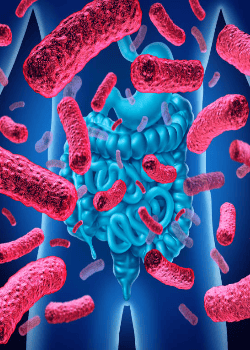
So what are the signs that you badly need one?
Well – here are the top factors you should take note of:
- Recurring Digestive Issues
- Antibiotic Use
- Skin Problems
- Difficulty in Losing Weight
- Food Intolerance
- Mood Swings
As I mentioned, our gastrointestinal tract contains our gut microbiome.
The bacteria that make it up play important roles in our different body functions.
Some of them include nutrient absorption, proper digestion and strengthening our immune system.
If you have an imbalanced gut, it will be hard for your body to fight different types of health issues.
With that – it's very important to maintain a healthy gut microbiome.
One way to do that is to take probiotics to help you achieve a good balance of gut bacteria.
Overall – the signs above are helpful to make you consider taking probiotics.
References:
1 – https://www.nhs.uk/conditions/-probiotics/
2 – https://ods.od.nih.gov/factsheets/-Probiotics-HealthProfessional/
3 – https://www.health.harvard.edu/nutrition/-health-benefits-of-probiotics/
4 – https://pubmed.ncbi.nlm.nih.gov/-28762696/
5 – https://www.hsph.harvard.edu/nutritionsource/-microbiome/
6 – https://www.cdc.gov/patientsafety/features/-be-antibiotics-aware/
7 – https://www.hopkinsallchildrens.org/-Antibiotics-When-Do-We-Really-Need-Them/
8 – https://www.nps.org.au/consumers/-antibiotics-explained/
9 – https://www.ncbi.nlm.nih.gov/-pmc/articles/-PMC3601687/
10 – https://pubmed.ncbi.nlm.nih.gov/-35625774/
11 – https://www.ncbi.nlm.nih.gov/-pmc/articles/-PMC8969879/
12 – https://www.ncbi.nlm.nih.gov/-pmc/articles/-PMC7916842/
13 – https://www.nhs.uk/conditions/obesity/-causes/
14 – https://pubmed.ncbi.nlm.nih.gov/-26565087/
15 – https://academic.oup.com/-bmb/article/123/1/159/-3930933/
16 – https://pubmed.ncbi.nlm.nih.gov/30987812/
17 – https://www.nhs.uk/conditions/-food-intolerance/
18 – https://www.betterhealth.vic.gov.au/health/-food-allergy-and-intolerance/
19 – https://www.ncbi.nlm.nih.gov/pmc/articles/-PMC6767923/
20 – https://www.ncbi.nlm.nih.gov/pmc/articles/-PMC4367209/
21 – https://www.hopkinsmedicine.org/-health/-brain-gut-connection/
22 – https://www.ncbi.nlm.nih.gov/books/-NBK545168/
23 – https://www.ncbi.nlm.nih.gov/-pmc/articles/-PMC5526216/
24 – https://pubmed.ncbi.nlm.nih.gov/-31345143/
25 – https://www.ncbi.nlm.nih.gov/-pmc/articles/-PMC5310545/
26 – https://www.health.harvard.edu/probiotics-and-cognitive-function/


